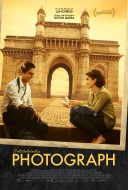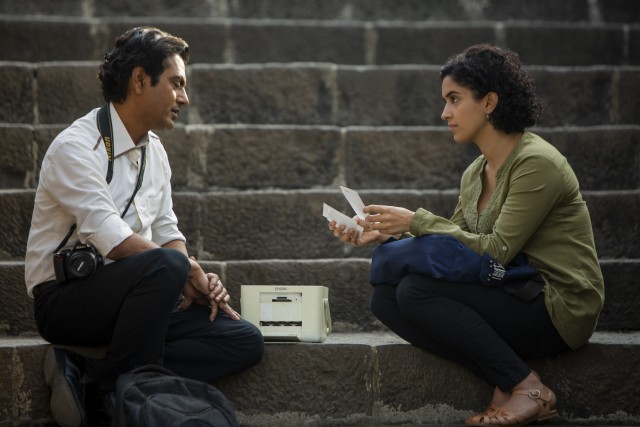Photograph Movie Review
 |
Photograph
Theatrical Release: May 17, 2019 (Indian Release: March 15, 2019) / Running Time: 110 Minutes / Rating: PG-13 Writer/Director: Ritesh Batra Cast: Nawazuddin Siddiqui (Rafi), Sanya Malhotra (Miloni), Farrukh Jaffar (Dadi), Geetanjali Kulkarni (Rampyaari), Vijay Raaz (Tiwari's Ghost), Jim Sarbh (Anmol Sir), Akash Sinha (Banke), Saharsh Kumar Shukla (Zakir Bhai), Virendra Saxena (Soda Distributor), Sam R. Kerawalla (Mr. Sodabottlewallah) |
Few people gave much notice or appreciation to Ritesh Batra's last two films, his English drama The Sense of an Ending and his American Netflix romance Our Souls at Night. So perhaps it is no surprise that he has returned to his native India to make a film more like his directorial debut. This one opens at the Gateway of India, a tourist attraction where our protagonist Rafi (Nawazuddin Siddiqui) makes his modest living hawking posed photographs he poetically describes as a way for people to immortalize their time there. Rafi takes the photos and prints them out on the spot with his semi-portable printer. One would-be customer runs off with her photo without paying while he reaches to get an envelope for her souvenir. Rafi takes it in stride. It's surely not the first time that's happened, but the incident has an impact on him that lingers.
Back in the bustling marketplace-packed part of Mumbai he calls home, Rafi hears from multiple friends/relatives that his beloved grandmother "Dadi" has gone off her medication as a form of protest against Rafi's lack of a mate. Rafi is a lifelong bachelor. A spring chicken, he's not. This is apparently unacceptable to an old Indian Dadi who wants great grand-children. To ease her concerns, Rafi writes her to say he's found someone, including a picture of the day's prettiest Gateway of India thief.
Upon hearing this, Dadi (Farrukh Jaffar) naturally decides to visit her grandson, arriving two days later. That gives Rafi just enough time to track down the woman in the photo, a high-performing accounting student named Miloni (Sanya Malhotra) and persuade her to play the part of his girlfriend. Miloni, a shy, quiet upper class girl who once flourished in drama, accepts the challenge, setting up this high concept charade.
It's a sweet idea on the page. Rafi is a good-hearted guy who just never has had any luck with women. Miloni does not seem content in the track her family has charted for her, complete with strategic meetings of suitable suitors.
In execution, it's far less charming. Rafi is old enough to be Miloni's father. And neither one of them has any personality, real or invented. The closest to an interesting quirk either of them has is that Miloni no longer drinks cola, ever since her favorite brand, Instead of seeing that thread through, Batra opts to end the film with something more symbolic and kind of meta. It's not even entirely clear if the open-ended final sequence, comes last chronologically. In fact, I'm pretty sure it doesn't, which renders it more frustrating than fulfilling, giving the film the illusion of artistic weight it doesn't really earn.
The same foreign culture that gives Photograph its flavor -- its exotic settings, its blend of English and Hindi that is almost always subtitled, the backdrop that is essential to the plot -- give us ideas about marriage, gender, class, wealth, and career that are strikingly antiquated by our own culture's standards. That's a trade-off you have to make and it yields an experience different from (and slightly better) than the typical mainstream US romance flick.
|
Related Reviews:
DVDizzy.com | DVD and Blu-ray Reviews | New and Upcoming DVD & Blu-ray Schedule | Upcoming Cover Art | Search This Site
DVDizzy.com Top Stories:
Now in Theaters: The Sun Is Also a Star • Booksmart • Avengers: Endgame
Written and Directed by Ritesh Batra: The Lunchbox • The Sense of an Ending
The Big Sick • 3 Idiots
Text copyright 2019 DVDizzy.com. Images copyright 2019 Amazon Studios, The Match Factory, Poetic License, Filmscience, Pola Pandora KNM, Skywalk Films.
Unauthorized reproduction prohibited.
